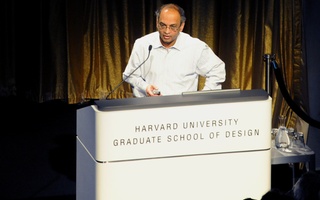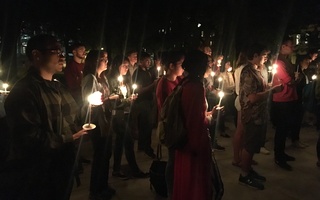UPDATED: October 31, 2017 at 1:11 p.m.
One month after Hurricane Maria hit Puerto Rico, urban planning experts joined students and faculty from the Graduate School of Design Friday to discuss ways to help the island recover after the devastating storm.
At Friday’s event, Puerto Rican landscape architect Jose Juan Terrasa-Soler and Alejandra Castrodad-Rodríguez, former Chief Resilience Officer for San Juan, spoke to a crowd of dozens at the design school.
The event, titled “Hurricane Maria and Puerto Rico: Lessons for Future Urban Disasters,” closely mirrored the format of an earlier event called “Hurricane Harvey and Houston: Lessons for Future Urban Disasters” that brainstormed relief efforts for the hurricane that hit southern Texas in August. Both events were organized and moderated by Professor Jerold Kayden.
Both speakers proposed long-term solutions to help Puerto Rico recover from the hurricane damage. Even weeks after the storm hit, millions are stranded on the island without electricity and access to running water.
Terrasa-Soler and Castrodad-Rodríguez said that Puerto Rican officials should rethink road locations and urban centers on the island, so that areas experiencing heavy human traffic are less prone to flooding. They also proposed establishing a network of Caribbean islands to support each other in times of disaster. Since Puerto Rico is located off the U.S. mainland, Terrasa-Soler and Castrodad-Rodríguez said shipping supplies from the states to the island has proved difficult.
Students who attended the discussion asked speakers about their thoughts for shorter-term relief.
“What do you think is our best chance? What exactly should we tackle, like specifically, if we want to start from somewhere? Because that’s the hard thing,” said Fabiola Guzman Rivera, a Design School student from Puerto Rico who attended the talk.
In response, Soler-Terrasa said he thought immediate efforts should focus on regaining power on the island.
“We need to get to a level of basic functionality that we need right now and that’s what we’ve been working towards,” he said.
Rosetta S. Elkin, a Design School professor who co-moderated the event, said afterwards that the discussion reflects uncertainty in responding to a recent onslaught of natural disasters. She added that she found it valuable to speak to actual residents of Puerto Rico about the hurricane’s aftermath.
“Being able to talk to contacts on the ground that we know and bring them to students, rather than having us translate knowledge, is, I think, a really important way of learning,” Elkin said.
Read more in News
History Department Courses Incorporate Digital Tools into Curriculum















